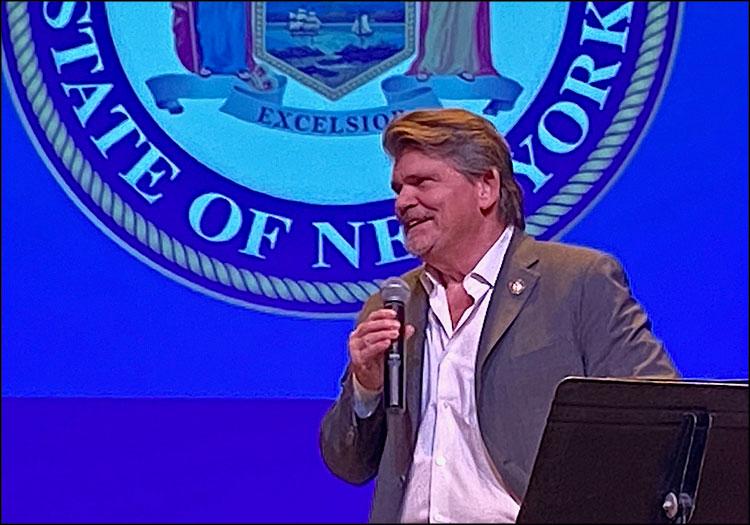New York State Assemblyman Tommy John Schiavoni came out firmly against the Nov. 5 federal Immigration and Customs Enforcement raids in Hampton Bays and Westhampton when he spoke at the inaugural East End LIVE, a conversation on issues impacting the East End of Long Island held last Thursday at LTV Studios in Wainscott.
Mr. Schiavoni, a former member of the Southampton Town Board, was elected one year ago to succeed Fred W. Thiele Jr. in the Assembly’s First District, which includes East Hampton, Southampton, Shelter Island, and Southold Towns, as well as part of Brookhaven Town. At LTV’s Studio 3, he answered questions, from the moderator Nichole Ferrera and the audience, on topics including tick-borne illnesses, water quality, state recognition for the Montaukett Indian Nation, and a potential redrawing of the state’s congressional district boundaries.
In a statement, Mr. Schiavoni said that ICE agents “descended on our communities and immediately began detaining civilians, causing fear and panic. Thousands across the country are being snatched off the streets without due process. Not only is this an affront to the United States Constitution and the New York State Constitution, but the lack of transparency harms the relationship of trust between public officials, law enforcement, and the public, putting civilians and law enforcement in danger.” He added that he was “deeply disappointed at this violation of due process and human dignity.”
Last Thursday, he stood by that statement. “The terminology earlier this year was ‘we’re going to get criminals off the street,’ “ he said. “I don’t think anybody has any problem with getting criminals off the street.” But, he added, “I think we’re better than this. And it’s not just the paramilitary look that these ICE agents have, that you can just buy an ICE patch and hide your face. It’s not who we are.”
“I’m particularly concerned with the notion that if groups become labeled as terrorist organizations, then this group,” ICE, “can be used against them too,” he added. “Where does it stop?”
“I have a lot of respect for our police,” he said. “They’re trained, they go to the academy, they respect people’s rights. They do a good job, in my opinion. . . . And you know what? They’re the first ones who show up. I believe that this kind of operation,” ICE, “really erodes trust in government and the police, and puts people in danger.”
In answer to a question from the audience, the former teacher said that schools “have been doing a great job with our children in this area, but when ICE came into Hampton Bays and Westhampton, the fear went through the communities like electricity, and all the kids know this, and it becomes very divisive for the students. . . . It is affecting our kids, and not just the children of Latinos who are here, but all of the children in the community.”
When it comes to public health, Assembly Bill 6047, which has passed in the Assembly and Senate and which Mr. Schiavoni sponsored, would require the State Health Department to publish an annual report on the incidence of tick-borne illnesses on its website and submit it to the governor and leaders of the Legislature, and require the superintendent of financial services to review the status of health insurance coverage for treatment of tick-borne illnesses. It would include details on the population of tick species and the percentage of ticks that are infected.
“With those numbers,” he said, “we could help our county Health Departments do more with tick-borne illnesses. It’s something that I think disproportionately affects the East End of Long Island.”
“Real data is something that just does not exist” at present. Health insurance companies “need to understand that chronic Lyme disease, for example, and other illnesses react and interact with people differently. This bill is just one step in a lot of work that needs to be done in this area.”
Ms. Ferrera asked the assemblyman what he has learned about threats to water quality and how they can be addressed. The perfluorinated chemicals “that we’ve seemingly put in virtually everything has become quite ubiquitous in our water supply,” he said. “This is going to take a lot of money to filter out this water. . . . It’s one of these things that collect in our bodies, and we’re really not quite sure what it does. We know it’s bad . . . but I believe that the ailments are just really beginning to show themselves.” The state offers grants to municipalities to purchase “very expensive water filtration systems that are needed to take this stuff out of our water.”
Assembly Bill 5295, which would reinstate state recognition and acknowledgement of the Montaukett Indian Nation, was unanimously passed in March, but recognition has been vetoed seven times, noted Mr. Schiavoni, who sponsored the current bill. The Montauketts were declared extinct in a 1910 court case that is widely seen as patently unjust.
“It’s the right thing to do,” the assemblyman said of state recognition. “The bill surrounds the fact that in the United States in 1910, judges did not have the authority to declare a people extinct. That was the role of the United States Congress. So we’re not giving them recognition, we are reinstating a recognition that was wrongfully taken from them, and legally incorrect too.” The bill is popular in both the Assembly and Senate, “and now it’s before the governor.” Gov. Kathy Hochul has until the end of the year to sign it, “and I’m convinced that she will.”
To a question about redistricting, Mr. Schiavoni noted that “the president has asked Texas to redistrict, and they were like, ‘Sure,’ and they did, and they’ve got five new seats that are specifically designed for one particular party.” (A federal court recently barred the state from using the new map for 2026, saying there was evidence of racial gerrymandering in the redrawing of the districts, but Supreme Court Justice Samuel Alito later granted the state’s request to pause that ruling.)
In New York, “we made it difficult” to redraw the congressional district map, Mr. Schiavoni said. “We actually put it into our Constitution that we needed an independent redistricting commission and that if we wanted to do this, we would have to put it up this session and then pass it the next session, and then it would have to go to the voters and the voters would have to approve a change in order for New York to redistrict between censuses. . . . It would have to go through the legislative process, signed by the governor, and we would essentially be undoing something that we had done in our Constitution. Some people call it the race to the bottom, and why should we do it? We don’t believe gerrymandering is right, but one particular party, at least the leadership of the party, believes that they should do it and are doing it” in Texas and other states as well.
Should New York follow those states, as California is planning to do, “we’d take a while, and by the time we do that, it would be 2028, so not in time for the midterms.”
“It is an honor to have you here, and your willingness, also, to participate in your own governance,” Mr. Schiavoni told the audience at the conclusion of the talk. “So thank you.”




